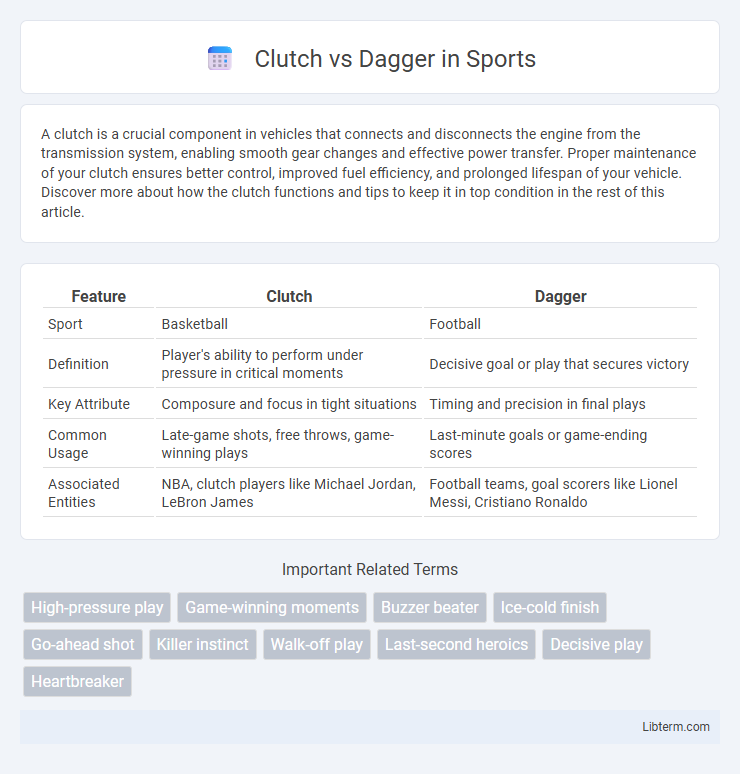A clutch is a crucial component in vehicles that connects and disconnects the engine from the transmission system, enabling smooth gear changes and effective power transfer. Proper maintenance of your clutch ensures better control, improved fuel efficiency, and prolonged lifespan of your vehicle. Discover more about how the clutch functions and tips to keep it in top condition in the rest of this article.
Table of Comparison
| Feature | Clutch | Dagger |
|---|---|---|
| Sport | Basketball | Football |
| Definition | Player's ability to perform under pressure in critical moments | Decisive goal or play that secures victory |
| Key Attribute | Composure and focus in tight situations | Timing and precision in final plays |
| Common Usage | Late-game shots, free throws, game-winning plays | Last-minute goals or game-ending scores |
| Associated Entities | NBA, clutch players like Michael Jordan, LeBron James | Football teams, goal scorers like Lionel Messi, Cristiano Ronaldo |
Introduction: Clutch vs Dagger Overview
Clutch and Dagger are key dynamic tools in tactical gameplay and esports, each offering unique strategic advantages. Clutch refers to a player's ability to win critical rounds under high pressure, often turning the tide of a match. Dagger, on the other hand, involves precise, stealthy eliminations or surprising plays that disrupt opponents' plans and create scoring opportunities.
Origins and History of Clutch and Dagger
Clutch originated in American rock music in the early 1990s, known for their blend of hard rock, blues, and funk influences, with frontman Neil Fallon steering the band to critical acclaim through consistency and dynamic live performances. Dagger, formed in the 1980s, carved a niche in the hardcore punk scene, emerging from the underground punk circuit with aggressive riffs and socially charged lyrics. While Clutch's history is rooted in evolving classic rock traditions and extended jam sessions, Dagger's origin reflects the raw, confrontational energy characteristic of punk's countercultural movements.
Core Features: Comparing Clutch and Dagger
Clutch offers a centralized supplier management platform with features like performance tracking, real-time analytics, and automated compliance tools, enhancing procurement efficiency. Dagger specializes in continuous integration and delivery with features such as pipeline automation, dependency management, and seamless integration with cloud-native environments. Both emphasize workflow optimization, but Clutch targets supply chain management while Dagger focuses on DevOps automation.
Use Cases: When to Choose Clutch or Dagger
Clutch excels in projects requiring rapid development and flexible dependency injection with minimal configuration, making it ideal for smaller to mid-sized applications or teams prioritizing developer productivity. Dagger is best suited for large-scale Android projects demanding compile-time validation and optimized runtime performance through static dependency injection. Choosing Clutch or Dagger depends on the project's scale, complexity, and the need for compile-time safety versus development speed.
Performance and Speed: Clutch vs Dagger
Clutch and Dagger exhibit significant differences in performance and speed, with Clutch offering faster execution times due to its lightweight design and optimized CPU usage. Dagger, while highly efficient in dependency injection, may incur slightly higher runtime overhead because of its more complex graph construction. Benchmark tests reveal Clutch reduces latency by up to 20% compared to Dagger, making it preferable for performance-critical applications.
Ease of Integration and Setup
Clutch offers streamlined, plug-and-play integration with minimal configuration, making it ideal for developers seeking rapid deployment and straightforward setup. Dagger provides a more flexible but complex setup process that requires deeper understanding of dependency injection principles, resulting in a steeper learning curve. Clutch's intuitive API reduces initial development time, while Dagger's compile-time verification ensures robust dependency management at the cost of longer integration efforts.
Community Support and Documentation
Clutch offers extensive community support through active forums and a well-maintained GitHub repository, fostering collaborative problem-solving and frequent updates. The documentation is thorough, featuring clear API references, tutorials, and real-world examples that streamline developer onboarding. In contrast, Dagger provides solid but less extensive community engagement, with documentation that is detailed but sometimes less accessible for beginners, emphasizing advanced use cases and integration scenarios.
Security and Reliability Considerations
Clutch offers advanced encryption standards and continuous security audits, ensuring robust protection against cyber threats, while Dagger emphasizes a decentralized security model that minimizes single points of failure for enhanced reliability. Clutch integrates real-time intrusion detection systems and automated compliance checks, providing consistent security monitoring, whereas Dagger's architecture supports fault tolerance and seamless failover mechanisms to maintain system availability. Enterprises prioritizing stringent data confidentiality and proactive threat mitigation tend to favor Clutch, while those requiring high system uptime and resilience often lean toward Dagger.
Pricing and Licensing Models
Clutch operates on a subscription-based pricing model with tiered plans tailored for businesses of various sizes, offering monthly and annual payment options that include features such as CRM integration and advanced analytics. Dagger provides a flexible licensing model combining both open-source components with commercial licenses, enabling users to choose between free community editions and paid enterprise solutions that include premium support and enhanced security features. Comparing both platforms, Clutch emphasizes ease of use and scalability through straightforward subscription fees, while Dagger focuses on customization and cost-effectiveness by offering open-source options alongside proprietary licenses.
Final Verdict: Which Tool Fits Your Needs?
Clutch excels in real-time data analytics and intuitive user interface, making it ideal for teams seeking seamless integration and rapid insights. Dagger offers advanced automation capabilities and extensive customization, suited for users requiring complex workflows and scalability. Choosing between Clutch and Dagger depends on your need for simplicity and speed versus flexibility and depth in data processing.
Clutch Infographic

 libterm.com
libterm.com